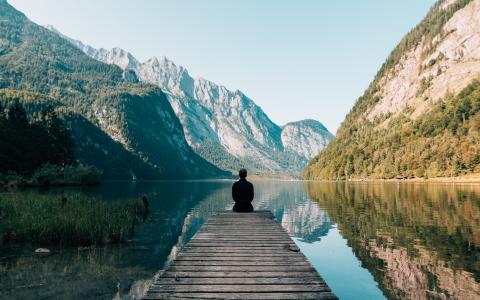
In a world where everything is nearly instantaneous, whether it's ordering takeout or groceries or everything else online, being patient can be extremely difficult.
Practicing patience is especially difficult when the stakes are high, and the US presidential election is no exception. Unlike many past elections, no winner was announced on election night. This is mainly due to the huge number of mail-in ballots that need time to be counted.
This has left many Americans feeling impatient and anxious, with their eyes glued to their televisions or laptops to see the latest polling numbers. Lynn Bufka, the American Psychological Association's senior director of practice transformation and quality, has been helping individuals learn how to practice patience for more than 20 years.
CNN: What exactly does it mean to be patient, whether we're in a campaign or no?
Lynn Bufka: Patience is having a little more capacity to sit, waiting for when certain things will happen, and being comfortable with that not being immediately clear. It is something that you can develop.
The day of an election when you're waiting for outcomes, and you're very committed to a particular outcome is not going to be the best day to develop greater patience, but it is possible. On a broader scale, you can be patient with a child's temper tantrums, certain kinds of behaviors from other people or expecting certain things from others.
CNN: Why is it so hard to be patient?
Bufka: Part of the challenge right now is, we would like to control things and decide things on our terms. The election outcome is not something we have control over after we vote. We are not the only ones who are making certain decisions and who are determining when and how things will happen. And that's harder. We're used to making decision about how our lives function, when we do things, where we go. Relying on an external process can be hard.
Another challenge with being patient is that we're in an environment where we often get things fast. We have fast food and can check our phones for instant information. And the higher stakes something is, the more we want it. The election feels high stakes to many people, so the outcome becomes something people have a lot of emotional investment in. When you're a little kid, you don't want to wait for Christmas -- it's so exciting. This is something that people have a lot of investment in -- the outcome of the election. And we aren't used to having to wait for information any longer.
CNN: What can people do to get better at patience?
Bufka: Think about places where being patient is hard, like standing in a line and waiting for it to move. Put yourself in situations that are relatively low value. For example, pick the longer checkout line at the grocery store. Talk to yourself about waiting and remind yourself that this is okay.
While I stand here, I can reminisce about a favorite vacation and think about something that makes me happy rather than focusing on the time waiting. Think about activities that you could show up early for. Learn that part of it is sort of mentally learning how to occupy yourself during that time, to switch away from the thinking that says this has to happen immediately.
CNN: When someone feels impatient, what are some good coping techniques?
Bufka: As we wait for election results, test yourself to sit with not checking and refreshing the webpage every 10 minutes, then increase the wait to 20 minutes, then 30 minutes. Get comfortable with knowing that's not really in your control and you will have to be patient about it.
Also, distract yourself and find something else to do. Baking is an activity that I enjoy. One of the nice things about baking is that you wind up with a product at the end that you're generally pretty happy with. Another example is cleaning out a junk drawer. That might require just enough focus that you're not spending your mental energy thinking about whatever it is you're anticipating. But also, in the end it gives you an outcome that you're happy you got it done while the
This article originally appeared on CNN.



